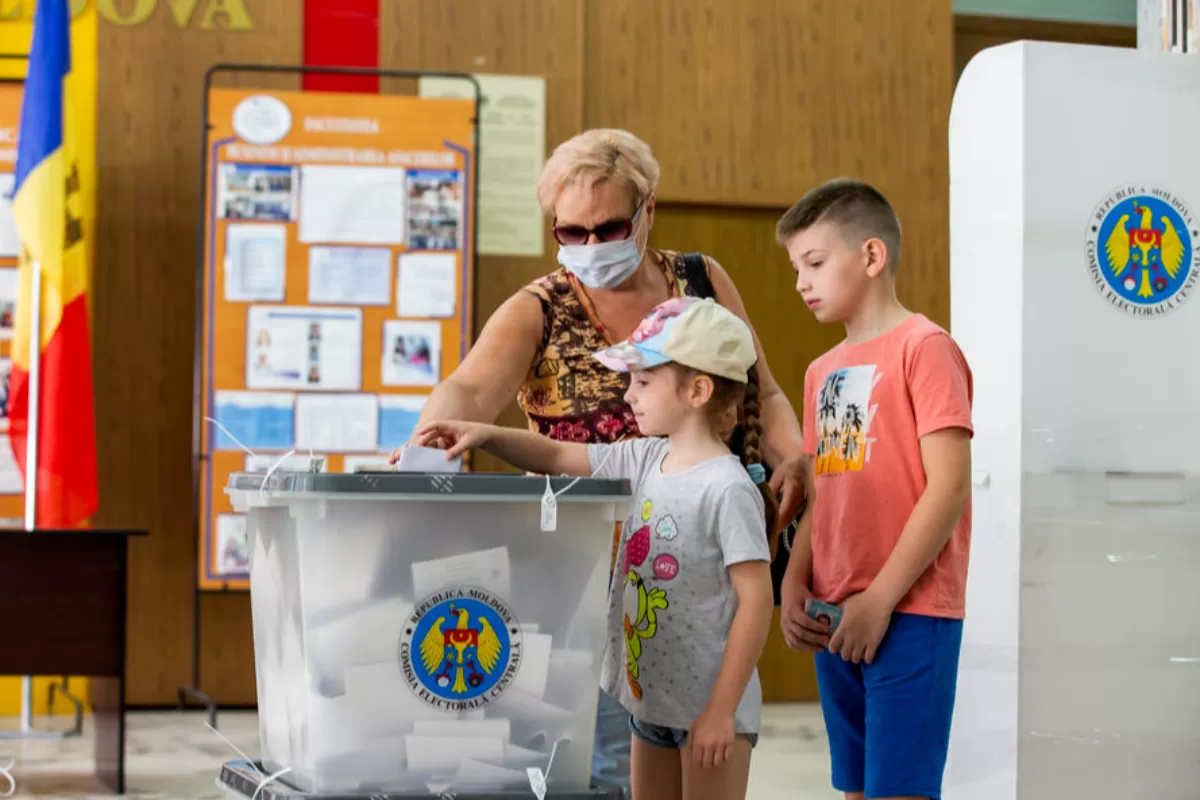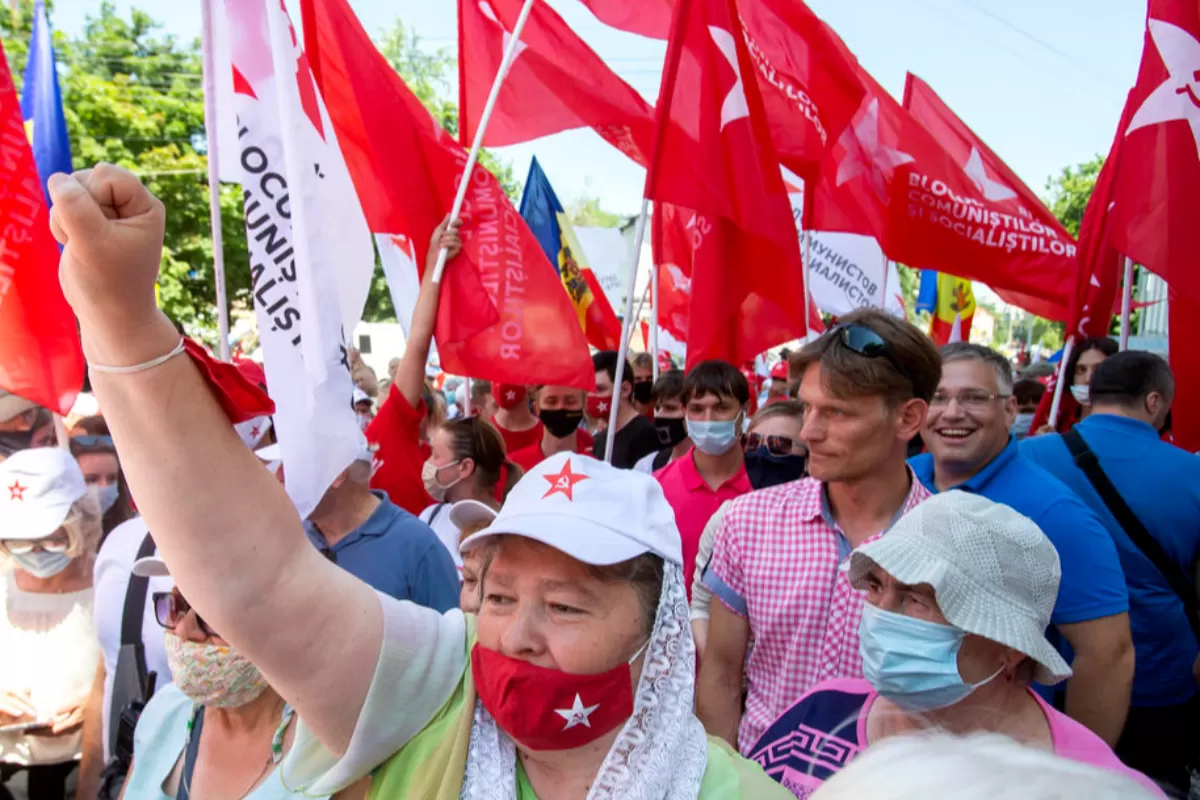
The alleged election fraud, including bribe-giving, was one of the hot topics in the Republic of Moldova on election day. While media outlets siding with pro-European parties revealed alleged cases of bribe reported on the left bank of the Dniester, the pro-Socialist press focused on offenses reported abroad.
One the main “arguments” about influencing voters in the Diaspora was a short video filmed by a young girl queuing outside a polling station in Frankfurt, Germany. In the background one can hear a few people talking and laughing, mentioning 50 Euro. A large number of press institutions affiliated to the Socialists carried the piece of news, suggesting the video is evidence that voters got bribed. The person who shot the video subsequently said it was all a joke, and that the media made erroneous assumptions.
NEWS: “Moldovans in Frankfurt, Germany, queued up in front of one of the polling stations from the first light of dawn. According to some images on social media, at 4:30 AM, over 50 people were already lined up, waiting to cast their vote starting 7 AM.
At the same time, a number of outrageous images were posted by an Internet user on a social networking website. During a discussion among Moldovans gathered outside a voting station, one of them says they will each receive 50 Euro in exchange for their vote.
“Maybe they will give us 50 Euro, they did that same for the presidential election”, the video posted on Facebook by Natalia Mirzenco reveals”, Sinteza.org writes in an article entitled “Scandalous revelations in the Diaspora: They will give us 50 Euro each for a VOTE”.
NARRATIVE: The right wing (PAS) defrauded the election at the polling stations set up outside the Republic of Moldova.
BACKGROUND: The role played by the Diaspora in the elections has increased significantly in recent ballots. Official figures concerning the exact number of Moldovan citizens living abroad are unknown, but authorities estimate approximately 800 thousand Moldovans live in the Diaspora, accounting for nearly a third of the total number of eligible voters.
In the second round of the presidential election in November, 2020, over 260,000 people voted in polling stations opened outside the country’s borders, tantamount to 16% of the total number of voters. Traditionally more active in Western Europe, the Diaspora particularly votes for the political right wing and pro-European parties, and it was instrumental in helping Maia Sandu win the presidential election.
In this context, Igor Dodon criticized Moldovans in the Diaspora, calling them “a parallel electorate”, and even arguing against setting up polling stations abroad.
The organization of the election in the Republic of Moldova was a much-debated topic in the election campaign. The Ministry for Foreign Affairs and European Integration recommended 190 stations be opened abroad, and the Central Electoral Committee sanctioned the opening of 139 stations, the same as for the presidential election. The opposition appealed the decision in court, and eventually CEC decided that 150 stations should be set up.
During the election campaign, the Socialists accused the Action and Solidarity Party and Maia Sandu of preparing to rig the election abroad, helped by Western powers.
In another development, the right-wing accused the Socialists of preparing to bribe voters on the left bank of the Dniester, as they allegedly did in previous ballots as well. An investigation carried out by Eureporter, based on information obtained from Igor Dodon’s personal cell phone, claims that the Socialists were ready to spend one million Euro to buy off voters on the left-hand side of the Dniester.
Against this backdrop, the Socialist media and the press close to the right-wing competed in presenting alleged cases of voters being bribed, both at home and abroad.
At a voting stations in Brussels, a man took his ballot outside, according to actualitati.md.
In turn, Pro TV Chișinău writes about alleged irregularities reported at a polling station in Moscow, where voters traditionally support left-wing parties, but also about a case where a woman in Moldova claimed she was paid 25 dollars to vote for Igor Dodon in the previous election.
The media also published a recording of a man in Moldova, claiming to have received 200 lei (10 Euro) to vote for Igor Dodon, but Socialist-linked media said the man was a right-wing sympathizer.
A large number of media outlets affiliated to the Socialist camp wrote about another case of manipulating voters – through music. “Moldovans in Germany, who came to cast their votes today, are being manipulated through music”, NTV writes, adding that the vocalist in question is a supporter of PAS and Maia Sandu.
PURPOSE: 1. To inoculate the idea that the right-wing defrauded the election in the Republic of Moldova. 2. To divert public attention from bribe-giving allegations reported on the left-hand side of the Dniester. 3. To mobilize left-wing voters at home against the “risk” that their fate should be decided by people who left Moldova. 4. To prepare public opinion for possibly disputing the result of the election.
WHY THE NARRATIVES ARE FALSE: The person who recorded the video published by certain media as evidence for defrauding the vote abroad subsequently commented on her post, arguing the discussion was misinterpreted, because the people talking about the 50 Euro were joking, and indeed, you can hear them laugh during the conversation.
“Come on, this is making me roll with laughter… But I do have to make a clarification about this video, which was shared by some “media websites” who misinterpreted it (or, better said, they interpreted it as they pleased). These were a bunch of young people queuing up to vote. They were having a laugh, singing, etc. They noticed me recording a video, so they pulled the 50-Euro joke. In fact, NO ONE was ever paid to cast their votes!!! Not last time, not now!!! There’s just too many of us in the Diaspora (no one has the kind of money to buy us off), and we know what we want for Moldova, because that is the future we want for ourselves and our children!!!!”, Natalia Mirzenco, the author of the recording, wrote.
In the parliamentary election, some 200,000 Moldovan citizens voted outside the Republic of Moldova, which would mean 10 million Euro, assuming every vote costs 50 Euro. It’s a huge amount of money, considering all the candidates enrolled in the race spent approximately two million Euro in the election campaign.
WHO STANDS TO BENEFIT: The Electoral Bloc of Communists and Socialists.

Disinformation uses a variety of manipulation tactics. Disinformation stories can easily be created by combining provocative topics.
Report
Not even the most optimistic supporters of the Action and Solidarity Party (PAS) were expecting a landslide victory in the early parliamentary election. PAS didn’t just face left-wing parties, represented by the Electoral Bloc of Communists and Socialists, but Russia itself, which tried to lend the latter a helping hand. Yet its victory is only the beginning: the real challenge for PAS lies ahead.

DEMAGOG 2021. The Chisinau Report, No. 5: Radio Yerevan
disinformation, manipulative stories and fake news continued to flood the media as usual. Maia Sandu, PAS and the West were again the favorite targets of disinformation and fake narratives. Fake news authors were pretty much unimaginative, as they have been over the course of the entire campaign, resorting to narratives they used before, both in the current campaign, as well as in previous ones: a victory for the right-wing would spell disaster for the country

Much like most other election campaigns in the Republic of Moldova, this summer’s campaign for the parliamentary election of July 11 was ridden with disputes which, at times, went way beyond the limits of common decency. We’ve seen controversial figures getting the spotlight, a great deal of disinformation, and we’ve had our fair share of extraordinary and laughable moments. Foreign policy was, once again, a major topic of debate. Less than 30 years since Moldova proclaimed its independence, it’s still unclear whether the country is headed West or East. Another recurring theme in this campaign was the fight against corruption, which has been discussed for years, without seemingly rooting out the weed of corruption that has spread to the point of nearly suffocating the whole country. Veridica has reviewed some of the topics, episodes and characters that grabbed the headlines during this election campaign.